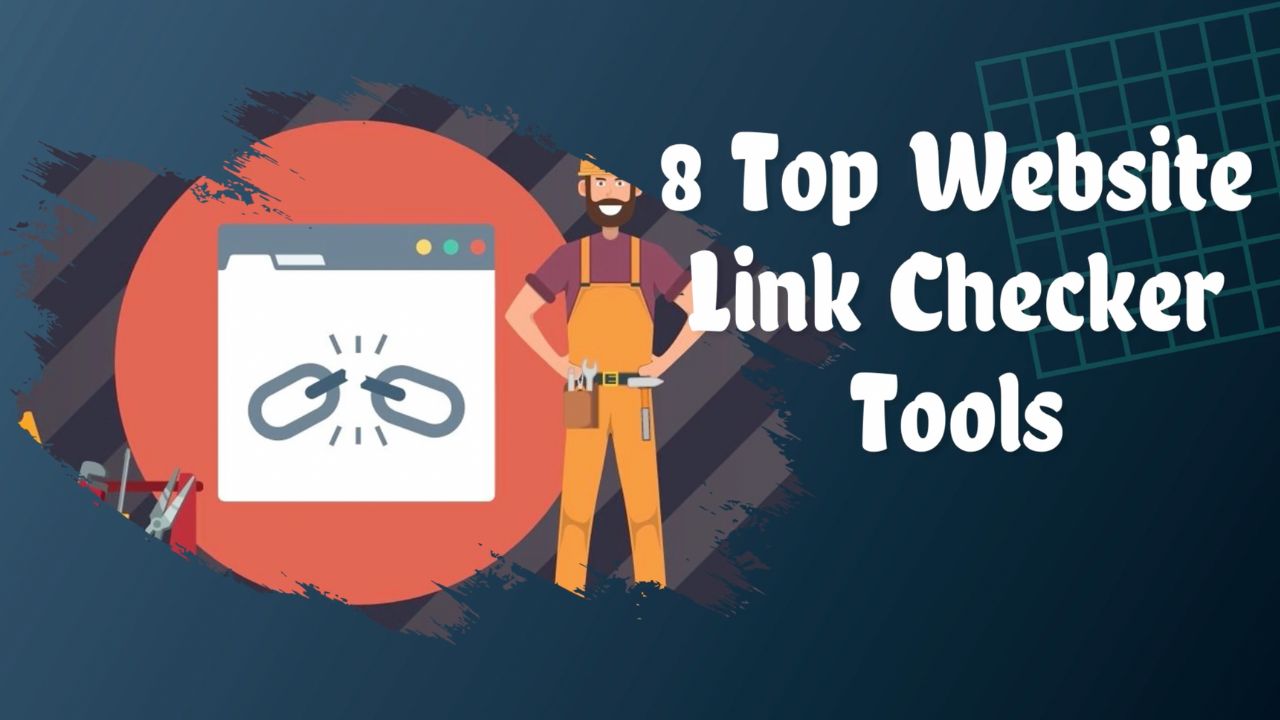One of the main channels for organic traffic is of course search engines:
- Over 53% of traffic for most websites comes from organic search, more than any other channel
- B2B businesses generate 2.5x more revenue from organic search
(What about social media? Despite all the attention it attracts, it only tends to deliver around 5% of organic traffic.)
In short, organic traffic from search engines really matters.
So, how can you get more of it?
One easy way to optimize your content is to ensure the links actually work.
Broken links can be a disaster on your website, leading to:
- A poor visitor experience.
- Lower rankings and less search engine visibility.
- Less traffic from search.
After all, Google and other search engines will prioritize web pages that work over those that don’t.
But the good news is that fixing your broken links is an easy way to reverse all the above:
- Improve your visitors' experience.
- Grow rankings and search engine visibility.
- Increase your traffic from search.
This post shows you exactly how to do that, with 8 top broken link checker tools you can put into action today to find and fix your broken links.
But first, let's be clear on why broken links are such a problem...
Why Are Broken Links So Damaging?
“…a broken link is doing some serious damage to your website, your reputation, and your business. A single broken link can impact your search engine rankings, your site’s user experience, result in lost customers and revenue, or, in the worst case, all of the above.”
SiteImprove.com
Whether or not your links work might just be one ranking factor out of hundreds (here are more), but it's an important one.
Broken links indicate:
- Out of date information.
- A poor user experience.
- An unmaintained website.
- The information provided might be out of date too.
So it's not too surprising that a broken link or two:
- Impacts the authority and credibility visitors may have otherwise given you.
- Reduces lead generation.
- Loses you sales and revenue.
- Drives frustrated visitors away from your website, and potentially towards those of competitors.
- Impacts your search engine rankings, visibility, and traffic—which can be extremely costly.
Broken links on your website need fixing, and fast!
But the good news is, they're easy to find... and once you've found them, you can fix them to resolve the problem.
FREE Custom Broken Link Correction Action Plan
Get a customized step-by-step guide based on your own website to find and fix broken links, boosting your site's SEO and user experience—it's 100% FREE!
Just hit the button now—it only takes a few seconds! →
How Can You Find Broken Links?
Checking the links on your website manually would of course be a non-starter.
Instead, website link checker tools can automatically check your website for you, and let you know about any issues.
And some are better than others!
(For example, if you use the wrong one, you can end up wasting time on false negatives, or run up against usability issues that make it a painful process).
So in this post, after looking at several such tools, we review 8 of the best currently out there...
8 Top Website Link Checker Tools
1. Deadlinkchecker.com
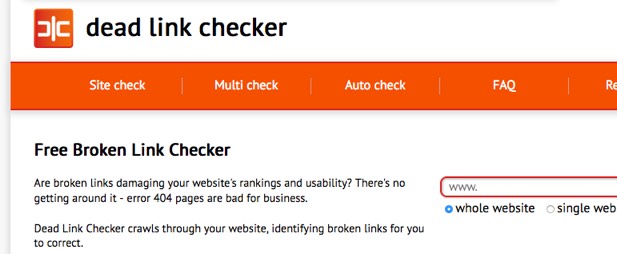
This free software is really simple to use, whether for a whole website or a single page.
Simply enter your URL directly from their website and click the check button:

The software then starts scanning your website for errors:

Note that some high traffic websites give a 403 Forbidden error to this kind of automated bot.
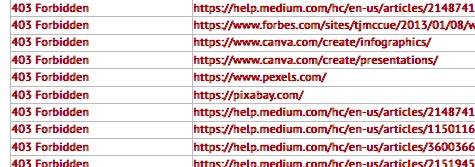
The 404 Not Found errors are the more important ones to look out for.
Note that this free check has a limit of 2000 links.
The site has two other modes of operation:
- Multi check—with a login account, you can check multiple websites at once and receive a report by email. As a free service, this is also limited to 2000 links.
- Auto check—this is a paid subscription service that scans one or more websites on a regular schedule, starting at $9.95/month for 1-5 websites and up to 50,000 link checks a month. Receive the reports by email or access via your account.
The type of link issues the software looks out for are as follows:
- 404 Not Found errors
- Timeout—this may just be a temporary issue with a particular website
- Server error, typically returning a 500 status. Again, this may just be a temporary issue.
- A 301 or 302 redirect to a non-existent page.
- Other errors that mean the web page you’re linking to is not displayed.
Where an issue is reported, the output shows the anchor (i.e. clickable) text associated with the link, along with the originating page so that you’re able to resolve it.
As well as clickable links, the software will tell you about broken images, links to non-existent resources within CSS files, and other problematic links such as in iframes and forms.
See their full feature list for more information.
2. Ahrefs.com

Ahrefs is a well-known and respected SEO tool that offers a free broken link checker.
An upgrade is required if you want to scan from a specific path only, or a specific domain without dropping into subdomains.
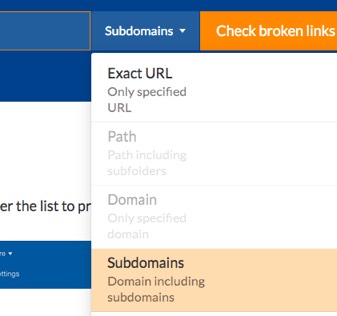
It came back with a result virtually instantaneously, apparently finding a broken link, although this was a false positive and the link it highlighted worked fine.
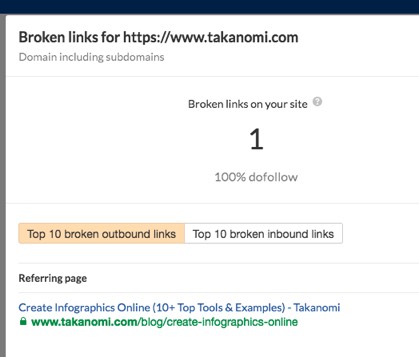
Interestingly though this tool doesn’t just scan for broken links from the website. It also finds incoming broken links too.
In my case, it highlighted nearly 300 broken incoming links that I wasn’t otherwise aware of, based on a previous incarnation of the website.
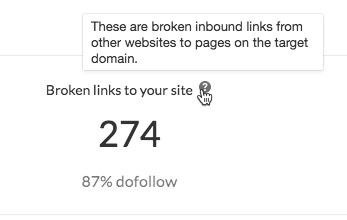
I can now investigate these broken incoming links some more, potentially either creating a page for the link to go to or redirecting the traffic elsewhere.
As a comprehensive SEO tool, you can upgrade to a full Ahrefs paid package for access to the full list of features, of which the website link checker forms a small part.
Pricing starts at $99/month, with a 7-day trial available for $7.
3. Brokenlinkcheck.com
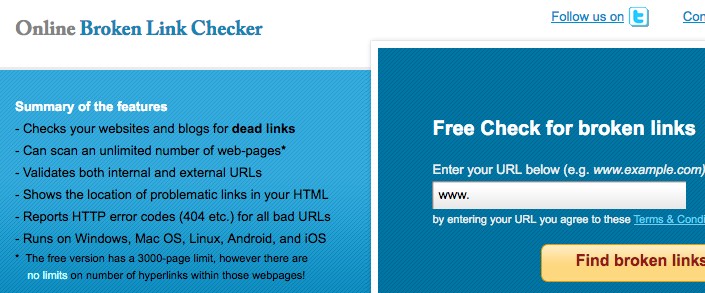
Although this site looks dated and isn’t even mobile-compatible, it appears to be a popular site, ranking at around 11,000 in Alexa at the time of writing, and climbing.
The free version of the software has a limit of 3,000 pages, and a single session per IP address. It also does not check any links to documents or images.
On starting to scan, the initial output is minimal and it also seemed very slow, taking several minutes to complete.
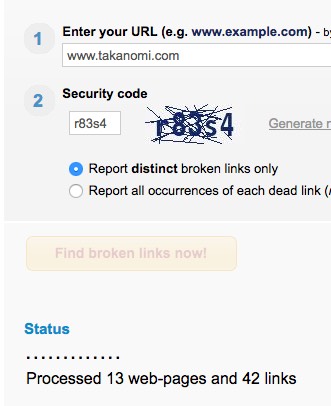
However, once complete, one useful part of the report is that you can see exactly where in the source code a problematic link appears. For example, at the time of testing, the following was registering as a timeout:
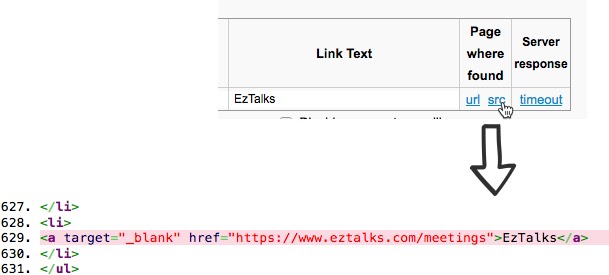
For access to more features via their ‘commercial version’, you need to contact them—there is no pricing available on the website itself.
The commercial version can check more pages, and can check subfolders or individual pages only.
4. Drlinkcheck.com
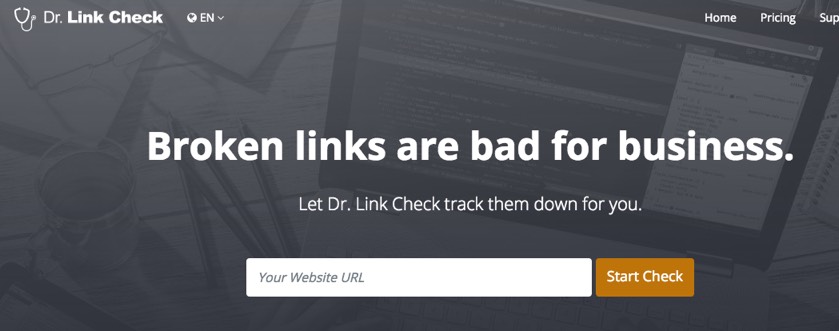
Dr Link Check is a modern tool designed solely for link checking, and is very straightforward and easy to use.
Out of all the tools so far, it had the most pleasant interface and output so you could see exactly what it was doing.
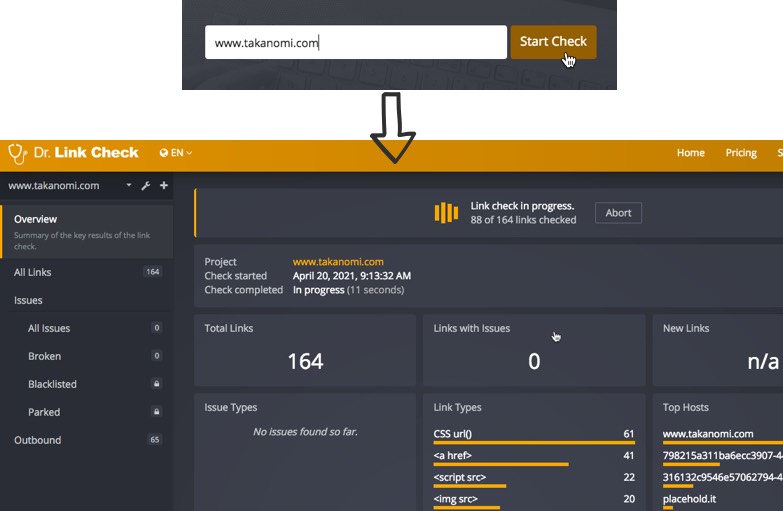
The Lite (free) subscription checks a maximum of 1,500 links, after which you need to upgrade, starting at $10/month.
Its paid features include blacklist checks (checking you’re not linking to websites listed as a malware or phishing site), parked domain checks and SSL certificate checks.
After all, just because a link doesn’t present a 404 Not Found error or some other invalid status code doesn’t mean it’s not a problematic link for visitors.
FREE Custom Broken Link Correction Action Plan
Get a customized step-by-step guide based on your own website to find and fix broken links, boosting your site's SEO and user experience—it's 100% FREE!
Just hit the button now—it only takes a few seconds! →
5. Error404.atomseo.com
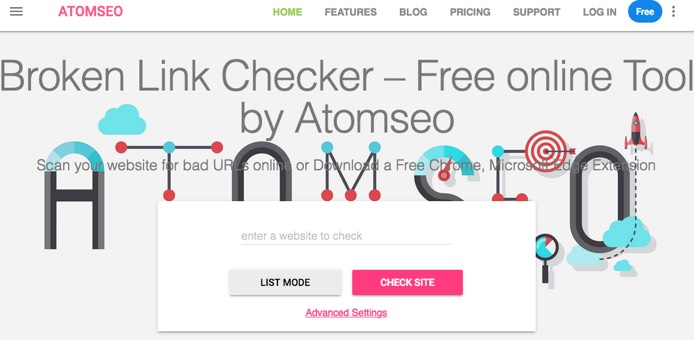
AtomSEO is another easy to use tool that checks the links on your website for free, with additional features available by upgrading.
To use it, just enter your website’s URL and click the Check Site button.
It then gives you useful feedback as it scans your website.
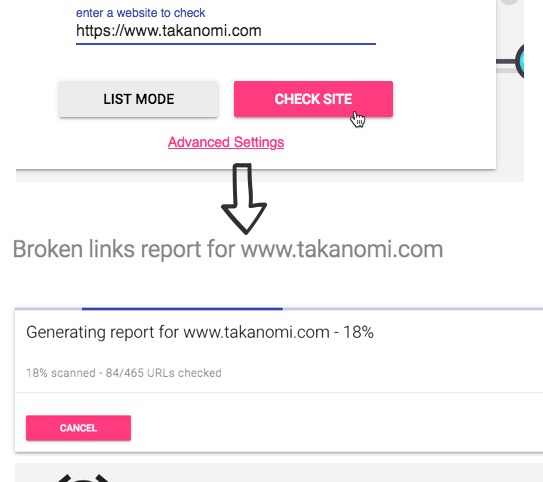
With the free facility, you can check up to 2000 links per day.
However, to see more than 5 link issues, you need to create a login account.
If you want upgraded functionality, pricing starts at $9.95 per month for up to 10,000 links per day.
Paid accounts also include facilities such as:
- The ability to schedule checks to run automatically, with a report sent to you by email
- Detection of duplicated SEO content
- The ability to export results to Excel
- Advanced settings—include or exclude URLs, specific folders or files; switch user agent, and set the speed of crawling in order to prevent any potential site issues.
As well as the link checker on their website, AtomSEO also provides a plugin for Chrome and Microsoft Edge that checks your website for broken links.
The ‘Broken Link Checker’ for Chrome has over 40,000 users and is rated 4 out of 5 stars.

After adding to Chrome and clicking the button, it scans all the links on the page, highlighting all working links in green.
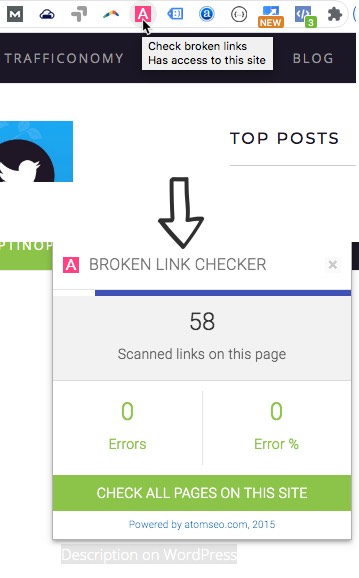
6. Powermapper.com
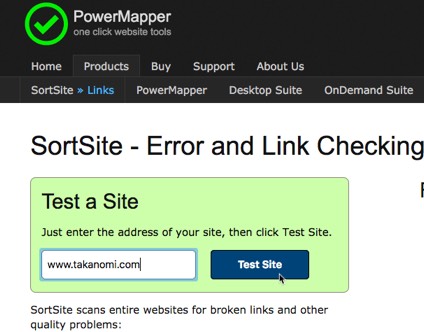
PowerMapper will scan your website for broken links and other issues such as missing images.
As well as on-page issues, it checks your CSS for missing background graphics and broken @import statements, broken links inside PDF and Office files, broken RSS feeds, and script errors.
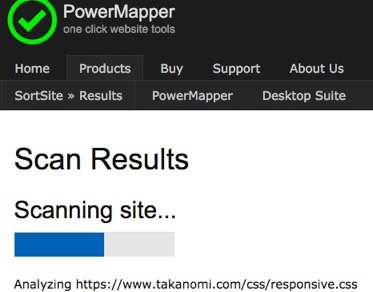
The free version of the software scans the first 10 pages of your website, providing you with a comprehensive report.
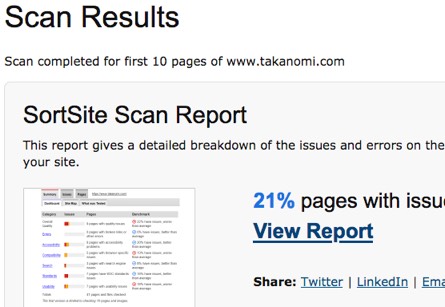
Beyond broken links, you’ll see issues relating to accessibility, browser compatibility, search engine guideline violations, W3C standards and usability, much of which is useful to look through, assess and potentially fix.
They have a few upgrade options, including downloadable desktop software, and their OnDemand Suite which includes broken link checking, spell checking and multiple other checks.
Pricing starts at $49/month, scanning up to 15,000 pages.
7. Broken Link Checker (WordPress Plugin)
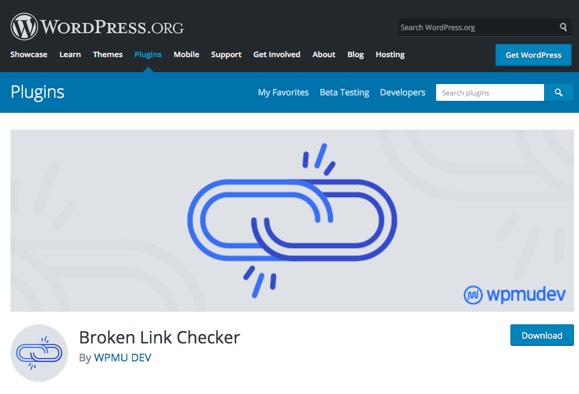
This link checker plugin for WordPress “monitors and tests all internal links and external links on your site looking for broken links”.
That includes links in your posts, pages, comments and the blogroll. It looks for broken clickable links, as well as missing images and redirects.
You can be notified of issues, either via the Dashboard or by email.
It’s a popular plugin, with over 700,000 active installations at the time of writing, is rated four stars, and is well-maintained.
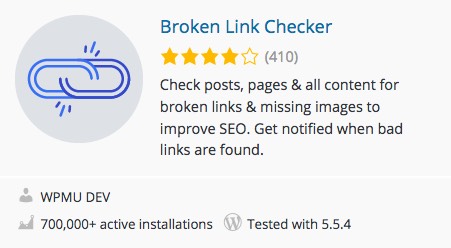
Useful features include the ability to:
- Prevent search engines from following your broken links, if wanted
- Edit links directly from the plugin’s page, rather than updating the post itself
Installing and activating the plugin was quick and straightforward. To configure, just click Settings from the plugin listing page.
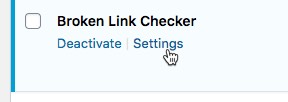
The plugin starts scanning for broken links as soon as it’s been activated, with the Settings page giving you a report of what it’s found so far.
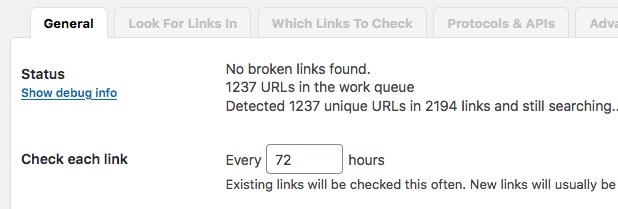
You can set how often to check each link, whether to send a report by email, whether to suggest alternatives to links that are broken, where it should look for links, and multiple other settings.
You can even add an API key for YouTube to facilitate checking YouTube links, rather than getting 403 Forbidden statuses.
In all, it’s a very comprehensive tool that’s ideal for checking sites running on WordPress.
8. W3C Link Checker
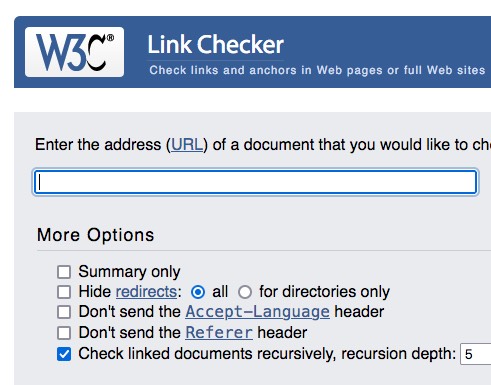
W3C provides a free link checker. Simply enter your URL or domain name, and click the Check button.
If you want it to spider your website, tick the Check linked documents recursively… checkbox and enter a suitable recursion depth.
By default, it sleeps for a second between requests to avoid any impact on your server.
While the output is a little long-winded and can take some time to review, it does point out some useful issues that other tools didn’t, such as links with permanent redirects including to brand new domains:

Frequently Asked Questions
Why are broken links so damaging?
Broken links can harm your SEO rankings, user experience, lead to lost revenue, and harm your website's credibility.
How can you find broken links?
Use website link checker tools to automatically scan and identify broken links on your website.
What is Deadlinkchecker.com?
Deadlinkchecker.com is a free tool to check for broken links on websites, offering modes like single, multi, and auto check.
What is Ahrefs.com's broken link checker?
Ahrefs.com offers a reliable SEO tool for checking broken links on websites, including incoming broken links, with additional features in paid packages.
What is the Broken Link Checker WordPress plugin?
Broken Link Checker is a popular WordPress plugin that monitors all internal and external links, notifies of broken links, and offers direct editing options.
To Conclude
Because of the negative impact that broken links have on your SEO, the amplification of your content, the visitor experience, and your reputation in general, it’s essential to both find and resolve any broken links as rapidly as possible.
With that in mind, this post has reviewed several of the most popular options available for checking links on your website.
Make it a habit to either regularly use one of these tools to scan for link issues on your website, or use one of the options available to schedule such checks to run automatically on a regular basis and send you a report.
FREE Custom Broken Link Correction Action Plan
Get a customized step-by-step guide based on your own website to find and fix broken links, boosting your site's SEO and user experience—it's 100% FREE!
Just hit the button now—it only takes a few seconds! →
